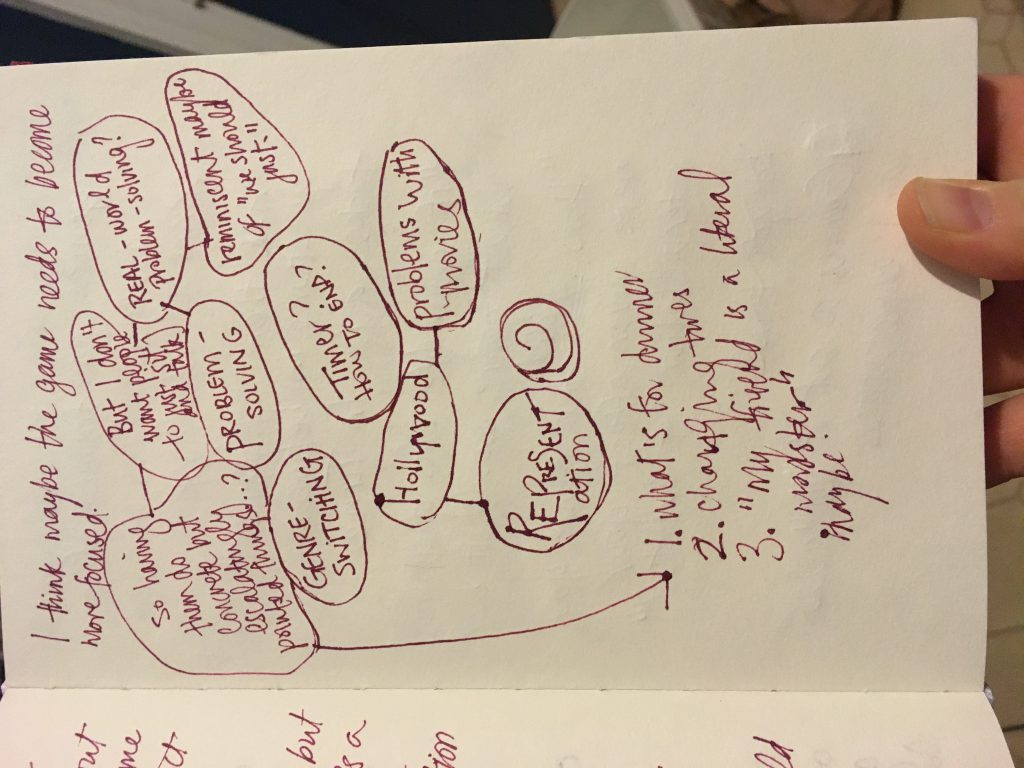This week, I took some strides towards having something complete and playtestable for my latest larp. Since I want to preserve the process, I thought I would share my notes with you as well as the new insights I’ve had today into the design.
NOTES February 14th-15th 2018
“I have compressed disc in my back that I am getting treatment for, which has limited the amount of work I was able to do in the past little while. Last week I spent some time playing some games that I thought might have a reflective angle to them (What Remains of Edith Finch, Oxenfree, and Nicky Case’s simulation, the Evolution of Trust, which I highly recommend and I think belongs firmly on our list of reflective media — http://ncase.me/trust/). I also started playing Fallout 4, and am pretty disappointed by it so far.
I also spent some time thinking more about the larp I’m designing. Right now, I’m trying to work on what I might be able to say using the setup that I talked with you about last week, with movie genres setting the horizon of expectations, and one player belonging to a different genre that must nevertheless be integrated into the narrative. I think the setup is going to work well to create a productive pause that can lead to reflection but the question is, what do I want players to reflect about? One thought is that I may be able to guide the reflection through whatever goal or scenario the players are given to work out, where acting according to different movie genres will lead to different modes of thought and therefore different solutions. That would turn this larp into a system that could contain many possible areas of reflection, in the same way that /This Just In/ could possibly operate with different scenarios in an expanded version.”
NOTES February 19th-20th
* Every player assigned a movie genre
* 1 Player assigned a different genre
* All players have to use the “yes, and…” rule and incorporate each other’s behaviours as if they were normal
* They have to solve a problem together while staying in character as the “movie-genre” version of themselves
PROBLEMS
* changing a flat tire, doing a grocery run, deciding where to get food, preparing a birthday cake
This version of the game would not necessarily lead to reflections about critical subjects — but does a game have to be about a critical subject to get us to reflect?
I don’t think so, in terms of creating the moment of reflection, but it might be nice to target things a little more, in order to say, talk about problems in film? Representation in all spheres is a problem in Hollywood.
Is there a way to bridge in a discussion around stats/these issues? I think players that could spontaneously discuss such things would be rare, or I would be preaching to the choir. I think maybe the game needs to become more focused.”
At this point, I drew this mindmap:
Here are my notes from today, February 21st 2018:
“genres as frames of analysis
genres as ideology
*Ask them questions in between tasks a la In Tune
‘if your life as a genre, what genre would it be?’
‘how did the genre you were given affect your interpretation of events?’
Genres: a set of ‘rules’ and expectations
Ideologies: a systematic body of concepts especially about human life or culture, a manner or the content of thinking characteristic of an individual, group or culture
change the ideology/genre, change the interpretation of events.”
So. This is what the game might look like. I’m not one hundred percent satisfied that this will be the best game ever, but would look something like this.
1. The Gamemaster loads a web app on their phone which gives them the genres to assign to players in secret via text message. The app also loads up the nature of the scene and the interstitial questions.
2. Players receive their genres via text message. The gamemaster describes the scenario and the starting scene setup with as little or as much colour as they want.
3. Players play through the scene in physical space. The Gamemaster provides improvised supporting detail as needed.
4. The Gamemaster decides when to cut the scene.
5. After the scene, the Gamemaster asks the interstitial question. [Not sure if players should just be allowed some time to reflect here or if there should be a discussion.]
6. The Gamemaster reloads the page for a new scene.
7. Play is of variable length — 3-5 scenes?
I’ve created a repository for the code here, but haven’t put anything in it yet. My goal is to have a working prototype of the game for next week.

